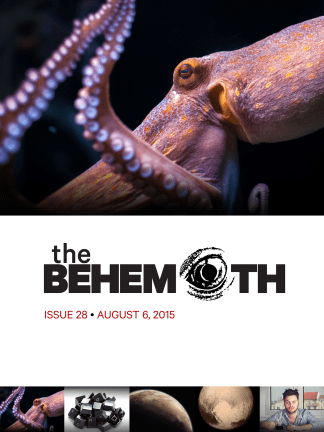Most nights when I stay up too late online, I go to bed regretting my lack of self-control—unless I’m on a Wikipedia binge. These binges typically start with the desire to answer a simple question. For example: when did the Spanish-American war take place and why? Two hours later, I’ve read about everything from Theodore Roosevelt to the federal telephone excise tax (used to fund the war). One of my favorite of these binges started with the rather benign search for details about the 1990s Disney Afternoon cartoon DuckTales and led to the discovery that the Beagle Boys and their mom were based on real-life gangster-mom Ma Barker. I think I shut my browser down sometime around the Pinkerton Detective Agency. I don’t feel guilty going on these excursions because I’m really just delighting in the vastness of God’s creation. No matter how many times I click on a new article, there’s always something else wonderful and new and astounding to learn.
To convey the wonder of exploring Wikipedia, I’ve decided to do a little experiment. What follows is a journey into Wikipedia’s depths by way of the “Random Article” feature on its front page and left navigation. Could repeatedly hitting the random button reveal something about this awesome universe we live in and our desperate attempts to understand it?
David L. Gregg (1819–1868)
Mr. Gregg is most notable for his 1853 appointment by President Franklin Pierce as Commissioner to the Kingdom of Hawaii. In this role he was to negotiate its annexation, which he failed to do. The picture of Mr. Gregg on his Wikipedia entry is a very faded grayish brown, and is either a competent drawing or a bad photograph of a young looking man with small glasses, a receding hairline, and a pleasant not-quite smile on his face. It occurs to me that I have no clue how the United States annexed Hawaii—one of the million things I should know about my country’s history but don’t (or at least can’t remember).
Normal (2009 film) (also known as Angels Gone)
A Czech film about an actual Czech serial killer named Peter Kürten, “told from the point of view of his defense lawyer.” I don’t think much about the possibility of foreign serial killers. It seems like such an American phenomenon, and I can’t decide if this is because of my biases as an American or if there’s some truth to my instinct.
This article is short enough to be classified by Wikipedia as a “stub”—notable enough to justify a Wikipedia page but not substantial enough to be considered a real article. The notability standards for a Wikipedia page are not easily met, which is surprising given that at the time I am drafting this article (11:28 PM CST, Thursday, July 9, 2015) Wikipedia has 4,912,823 articles in English. The last print edition of the Encyclopædia Britannica, published in 2010, had just over 40,000 articles.
QID
An acronym that either refers to a medical abbreviation (quarter in die) meaning “four times each day” or to a chess opening, Queen’s Indian Defense. I know nothing about either of these subjects. This turns out to be a “disambiguation page,” a sort of landing site for people who aren’t really sure if they want to give someone morphine four times a day or respond to White’s 1.d4. I don’t want either, so—
San Juan del Río Municipality, Durango
The most common sensation when exploring Wikipedia is the realization that you really have no clue about anything in the world. There are entire phyla, whole cataclysmic events out there worthy enough for a coveted Wikipedia page, and I don’t even know that I don’t know anything about them. Here is this municipality in northwestern Mexico with a population of 11,855 people (2010) that up until 12:03 AM CST, Friday July 10, 2015, I had no idea even existed. Suddenly, I’m grateful for Wikipedia. While the rest of the world goes on in utter ignorance of the lives of 11,855 people, at least here they have some representation. They are mapped and accounted for. Surely that counts for something.
Classical Prose Movement
The page begins with an ominous warning: “This article does not cite any references or sources. Please help improve this article by adding citations to reliable sources. Unsourced material may be challenged and removed. (December 2009)”
Despite the warning, it is a wonderful article. I learn that in the late Tang dynasty in China two great literary figures, Han Yu and Liu Zongyuan, began a movement towards clear and direct prose, in reaction to the older style of parallel prose. Apparently the movement incorporated colloquial language and was used to expose government corruption and combat Taoism and Buddhism.
Or maybe it did none of these things. I honestly don’t know because the entire article is unsourced. This could be propaganda from the People’s Republic of China or the ranting of a lunatic for all I know. Which brings us to the most important paradox of the Internet: publicly we all dismiss Wikipedia as “unreliable” because “anyone can write anything on there” (which is not exactly true), but in practice most of us use it daily for everything from the mundane (“Who is that actor, honey?”) to the serious (“What’s the Nicene Creed, again?”). Wikipedia is the sixth most popular site in the United States. It is our go-to source for just about anything we think of as “facts.” And so much of our reliance on it has become automatic (in part because of smartphones and the way Google lists Wikipedia pages so high in search results) that we rarely feel that we can’t find an explanation for a historical event or a scientific description of a bug we see on a walk or whatever phenomenon we want answered. It’s all there, somewhere in those 4,912,823—wait, I can now (12:42 AM) confirm that we are up to 4,912,884—articles.
That’s the paradox of the Internet Age. Even as we grow increasingly aware of the unreliability of projects like Wikipedia, we also grow increasingly reliant on them.
Gravina (River)
This Italian river flows from Poggiorsini through the province of Matera and empties into the Bradano. There’s no image with this article, which is unfortunate because I would like to know what it looks like. Its existence is verified by a reference to Atlas of the World: Comprehensive Edition, Plate 80 (M2), 1985. But there is no link to the book, so I’ll have to just trust that Plate 80 (M2) is reliable evidence.
Our anxiety about the reliability of Wikipedia stems from the ability of anonymous users to create, edit, and delete articles. If you’ve ever clicked the “View history” tab at the top of an article, it’s rather like looking behind the curtain. A list of usernames, dates, file sizes, and actions taken are given for each edit. For the Gravina article, the list is very short. It was created in January of 2010 and hardly touched since. In a more controversial article, we would find long debates between editors about definitions, and what constitutes a fact, and what requires a citation, etc.
We keep these discussions hidden in part because we like to believe the myth that we can easily and confidently lay out facts like a Wikipedia article. The whole Wikipedia project is an attempt to totalize our existence, to archive, define, interrelate, and account for every discrete and disparate aspect of reality, which is itself a part of the greater humanist project of completely knowing and overcoming our world. This theme goes back to the origins of encyclopedias. Some of the earliest encyclopedias focused on criticizing superstitions and religious beliefs, and the very form of the encyclopedia, this thing that explains everything, was part of the criticism.
It’s still that way today. The majesty of Wikipedia is that it is representative of humanism’s best hope for progress: humans across the world and across time working together, using all their collected knowledge to explain reality. Because we innately know that existence is irreducibly complex, the very idea of somehow collectively overcoming that complexity is kind of its own religious hope—a hope in the power of the human mind to conquer the material world.
But understood this way, Wikipedia is a self-defeating myth. The more we archive and catalogue our universe, the more its utter inability to be archived and catalogued is made clear. And while maybe we know this on some level, we really don’t like to be reminded of it. So we keep our doubts hidden. We keep the debates about dates and historical figures hidden behind the “View history” tab where we can avoid reckoning with it. And even when we do remember how contentious a Wikipedia article may be, we like to think that the problem is not that the universe is impossibly vast, but that the page editors just haven’t cited the right research yet. “If only they had read this scholar, these Wikipedia editors would know better than to claim that the South seceded over state’s rights,” we say to ourselves. Or it’s a problem with time. Today we don’t know, but eventually, if we keep working at it, we will get down to the facts.
Paul Hoffman (science writer)
Here’s what I mean: the experience of exploring Wikipedia fills us with a conflicted sense of pleasure over the grandeur of God’s creation and frustration over its incomprehensibility, which is also part of its pleasure. We quixotically believe in our ability to collectively explain everything, but are continually surprised by reality’s vastness, at the untraceable relations between things. Like when you’re writing a piece on Wikipedia and the whole project of encyclopedic categorization of reality as it reveals itself through Random Articles on the site, and my decision to click the Random Article button one last time lands me on the page of Paul Hoffman, the former president and publisher of Encyclopædia Britannica.
Mr. Hoffman is apparently a genius and something of a living model of the encyclopedic spirit. He was editor-in-chief of Discover magazine for ten years, has written numerous books on science and puzzles, has appeared on television, and is involved in several food service enterprises. According to the article, Chicago magazine called him “the smartest man in the world.” The image that accompanies the article is of Mr. Hoffman standing on a stage, presenting at a conference in 2009. He’s wearing blue jeans and a blue tie-dyed shirt, his hands raised, palms upward as if asking for a benediction, or perhaps in a shrug of resignation. And what is our gesture before the vastness of creation? Do we come hands outstretched, as supplicants, in gratitude for the always-more of existence, for our presence in a universe that is uncontainable beyond our wildest imaginings? Or have we resigned ourselves to the endless task of uncovering the universe’s secrets in vain hope that one day, together, we might archive it all—hyperlinked, cited, and disambiguated.
Alan Noble is the managing editor and co-founder of Christ and Pop Culture. He is an assistant professor of English at Oklahoma Baptist University.










